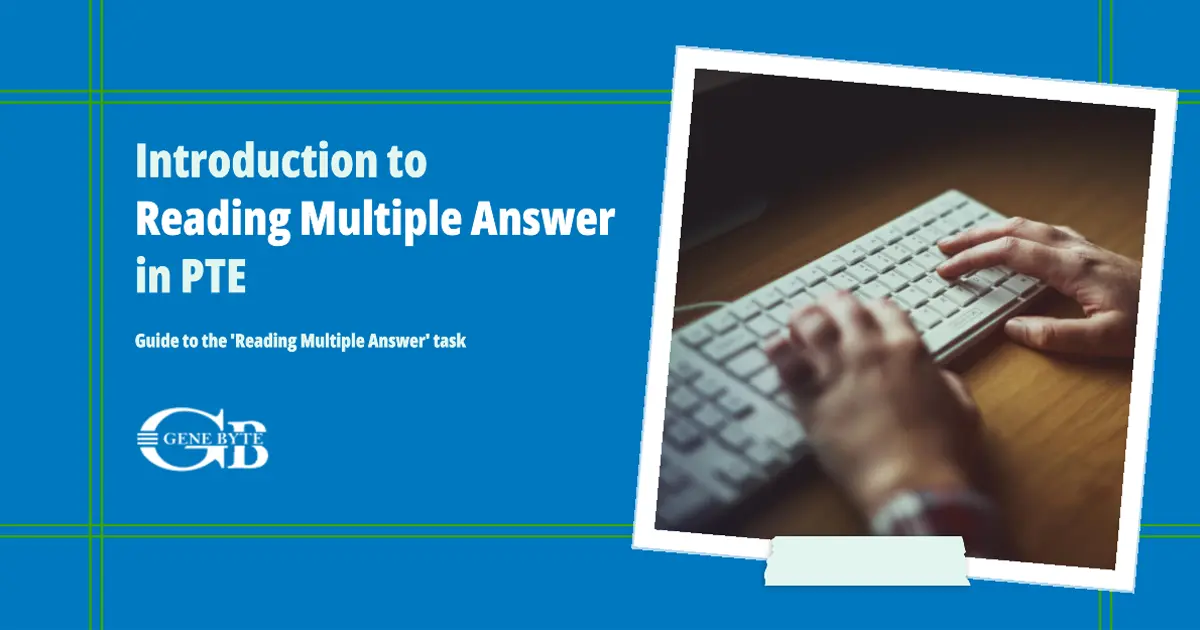Mastering the PTE Academic's Multiple-choice, Choose Multiple Answer section demands not just comprehension, but strategic insight and precision – key skills that Genebyte's platform expertly enhances for educators and students alike.
The Multiple-choice, Choose Multiple Answer task in the PTE Reading Section is a significant challenge. It tests not just reading comprehension, but also critical analysis and strategic thinking. As educators, understanding this question type is crucial for guiding students to success.
Key Takeaways
- Task Requirements: Analyze a text of up to 300 words and select multiple correct answers from several options.
- Skills Assessed: Tests reading comprehension, critical thinking, and decision-making skills.
- Useful Strategies: Understanding the task helps educators develop teaching methods that align with its requirements.
- Empowering Educators: Genebyte provides tools and knowledge to help teachers navigate this complex question type effectively.
At Genebyte, we recognize the pivotal role teachers play in preparing students for the PTE Academic exam. Our focus is on empowering educators with advanced tools and strategies to enhance teaching methodologies. Understanding the nuances of the Multiple-choice, Choose Multiple Answer section helps educators better prepare their students for success. This question type requires a deep understanding of the text, the ability to discern subtleties, and informed decision-making. Genebyte provides educators with the knowledge and resources needed to help students excel in their language proficiency assessments.

Overview of PTE Academic's Reading Section
PTE Academic, a globally recognized English proficiency test, is designed to evaluate the language skills of non-native English speakers. The Reading section of PTE Academic, a critical component of the test, assesses a wide range of reading skills. This includes the ability to read and understand academic English texts.
The Reading section is structured to reflect real-life settings where English is used, covering a variety of subjects. Test-takers encounter different formats such as multiple-choice questions, re-order paragraphs, and fill in the blanks, all aiming to gauge their comprehensive understanding of written English.
Importance of Multiple-choice, Choose Multiple Answer (Reading) in PTE Academic
Among the various question types in the Reading section, the Multiple-choice, Choose Multiple Answer question type stands out due to its complexity and significance. This particular question type involves a text of up to 300 words and requires the test-taker to select more than one correct response from several options provided.
This question type is significant for several reasons:
- Assessment of Critical Reading Skills: It evaluates a candidate's ability to not only understand the text but also to analyze and evaluate the information presented. It requires a deep engagement with the content, demanding skills beyond basic comprehension.
- Challenge of Selecting Multiple Correct Answers: Unlike single-answer questions, this format adds complexity by requiring the identification of all correct options. This challenges test-takers to consider all possible angles and interpretations of the text.
- Scoring Implications: The scoring for this question type is nuanced. Candidates are awarded points for each correct answer selected but may also be penalized for incorrect choices. This scoring method emphasizes the importance of accuracy and critical judgment.
- Reflective of Real-World Skills: This question type mirrors real-world scenarios where individuals must analyze complex information and make informed decisions based on multiple factors.

Understanding the Task - Multiple-choice, Choose Multiple Answer (Reading) in PTE Academic
Description of the Question Type
The Multiple-choice, Choose Multiple Answer is also a task in the Reading section after Reading and Writing: Fill in the Blanks. This question type presents a text, typically up to 300 words, followed by a multiple-choice question. The challenge lies in selecting more than one correct response from a set of options, making it a task that requires both depth and breadth of understanding.
Task Requirements
The task demands a nuanced approach from the test-taker. It involves:
- Thorough Reading: Candidates must read the text carefully to grasp the main ideas, as well as the finer details.
- Critical Analysis: This involves analyzing the tone, purpose, and content of the text.
- Judicious Selection: Candidates must select all the responses they believe are correct. It's a balancing act between being comprehensive and accurate.
Prompt Length and Content
- Length: The texts are typically up to 300 words, dense with information.
- Content: These passages can cover a wide range of academic topics, requiring a broad understanding and the ability to quickly adapt to different subjects.
Skills Assessed in This Question Type
- Understanding of Text: Ability to grasp the main idea, theme, or purpose of the text.
- Analysis: Evaluating the quality, style, and tone of the text.
- Detail Orientation: Identifying specific details, facts, opinions, or the sequence of events.
- Inference: Drawing conclusions and understanding implicit meanings.
Incorporating Genebyte's solutions not only prepares students for the PTE Academic but also instills in them reading skills that are invaluable in their academic and professional lives.

The Challenge for Educators - Preparing Students for the Task
The Role of Educators in Preparing Students for This Question Type
The Multiple-choice, Choose Multiple Answer question type in PTE Academic's Reading section presents unique challenges for educators. As instructors and mentors, their role extends beyond teaching basic reading comprehension. They must equip students with the skills to analyze complex texts and make informed decisions under exam conditions.
- Developing Critical Analysis Skills: Educators must focus on enhancing students' abilities to dissect and interpret texts, identifying not just the main ideas but also subtle nuances and implied meanings.
- Teaching Effective Exam Strategies: Given the negative marking in this section, it's crucial for educators to teach students how to approach these questions judiciously, balancing the need to be thorough with the risk of over-selection.
Understanding the Complexity and Critical Thinking Required
The Multiple-choice, Choose Multiple Answer task requires a high level of engagement with the text. Educators need to foster students' skills in:
- Analyzing Textual Tone and Purpose: Students must learn to discern the author's intent and the tone of the text, which are often key to understanding the correct answers.
- Identifying Key Details and Inferences: This task assesses the ability to pick out specific details and make logical inferences, a skill that must be honed through practice.
By leveraging Genebyte's advanced solutions, educators can effectively prepare their students for the Multiple-choice, Choose Multiple Answer question type, ensuring they possess the necessary skills and confidence to excel in the PTE Academic Reading section.

The Nature of Multiple-choice Questions in PTE Academic
Differentiating Between Single Answer and Multiple Answer Questions
In the PTE Academic Reading section, the distinction between single-answer and multiple-answer questions is critical for both educators and students. Understanding these differences is essential in developing effective preparation strategies.
- Single Answer Questions:
- Require the selection of one correct option from several choices.
- Focus on assessing the understanding of a specific detail or main idea within the text.
- Multiple Answer Questions:
- Involve selecting more than one correct response from a given set of options.
- Test a broader comprehension of the text, including details, inferences, and the ability to synthesize information.
The Importance of Analytical Reading Skills
Analytical reading skills are paramount in tackling multiple-answer questions. These skills involve:
- Close Reading: Understanding the text in-depth, beyond its surface meaning.
- Critical Thinking: Evaluating and synthesizing information from different parts of the text.
- Selective Judgement: Making informed decisions on which options are correct, especially crucial given the possibility of negative marking for incorrect answers.
By focusing on these aspects, Genebyte empowers educators to effectively prepare their students for the challenges of multiple-choice questions in the PTE Academic, thereby enhancing their overall performance in the Reading section.

The Significance of Correct and Incorrect Choices in PTE Academic
Scoring Mechanism: Points Awarded and Deducted
In PTE Academic's Multiple-choice, Choose Multiple Answer reading task, understanding the scoring mechanism is crucial. It's not just about selecting the right answers, but also about avoiding incorrect ones due to the negative marking involved.
- Points for Correct Answers: Each correct response earns the test-taker points, contributing positively to their overall score.
- Penalties for Incorrect Answers: Incorrect choices result in points being deducted, which can significantly impact the final score.
The Impact of Negative Marking on The Score
The negative marking in this section adds a layer of complexity to the task, making strategic selection vital. Here's how it affects scoring:
- Balancing Risk and Reward: Test-takers must carefully weigh each option, as incorrect selections can negate the points earned from correct answers.
- Encouraging Precision: This scoring mechanism promotes precision in reading and selecting answers, discouraging guessing or random selection.
By integrating Genebyte's solutions, educators can effectively train students to navigate the intricacies of the scoring mechanism in the PTE Academic's Multiple-choice, Choose Multiple Answer reading task, thereby enhancing their overall performance and score in the exam.

Special Tricks for Tackling Multiple Answer Questions in PTE Academic
Identifying Common Challenges
Tackling the Multiple-choice, Choose Multiple Answer questions in the PTE Academic requires more than just understanding the text. It involves strategic thinking and careful selection. Common challenges include:
- Over-selection of Options: The temptation to choose multiple options, increasing the risk of negative marking.
- Time Management: Balancing thorough reading with the time constraints of the test.
- Discerning Subtle Differences: Differentiating between seemingly similar options that may lead to incorrect choices.
Strategies for Effectively Approaching the Question Type
To effectively approach this question type, the following strategies can be employed:
- Identify Keywords: Focus on identifying keywords in the question and options, and look for synonyms or related terms in the text that match these keywords.
- Elimination Technique: Systematically eliminate clearly incorrect options, paying attention to absolutes and extreme language as red flags.
- Understanding the Context: Read around the keywords to grasp the context and be cautious of options that match the text word-for-word, as they can be traps.
- Practice with Variety: Regularly practice with diverse texts and familiarize yourself with different types of questions and answer options.

Genebyte's Approach to Teaching this Question Type
Integrating Genebyte's Tools and Strategies in Teaching
Genebyte's innovative B2B SaaS platform is designed to revolutionize the way educators prepare students for the Multiple-choice, Choose Multiple Answer (Reading) section of the PTE Academic. Our approach focuses on integrating cutting-edge technology and pedagogical expertise to enhance teaching effectiveness.
- Customized Learning Modules:
- Interactive modules tailored to the specific needs of each student, focusing on the nuances of multiple-choice questions.
- Real-time adjustments based on student performance to ensure continuous learning and improvement.
- Advanced Analytical Tools:
- In-depth analytics to track student progress, identifying areas of strength and those needing further development.
- Insights into common errors and misconceptions, enabling educators to focus their teaching strategies more effectively.
- Comprehensive Resource Library:
- A vast collection of practice materials, including texts and questions that mirror the PTE Academic format.
- Resources are updated regularly to keep pace with the latest exam trends and standards.
Genebyte's commitment to elevating PTE Academic preparation extends beyond providing tools and resources. We strive to create an ecosystem where educators are equipped with the knowledge, skills, and technology to deliver exceptional teaching experiences, ultimately leading to higher student success rates in the PTE Academic exam.

Actionable Tips for Multiple-choice, Choose Multiple Answer Questions
To excel in the PTE Academic Multiple-choice, Choose Multiple Answer (Reading) section educators need to emphasize on strategic preparation:
- Focus on Key Themes: Identify main themes and ideas within the text.
- Practice Precision: Be precise in answer selection to avoid negative marking.
- Time Management: Balance thorough reading with efficient time management.
- Interactive Learning Tools: Simulate real exam conditions.
- Variety of Content: Practice materials for different learning needs.
- Use Practice Tests: Regularly engage with practice tests to build familiarity with the format.
- Data-Driven Insights: Track progress and tailor teaching strategies.
The Multiple-choice, Choose Multiple Answer (Reading) section is challenging and requires strong reading comprehension, strategic thinking, and careful selection due to negative marking. Educators should emphasize targeted strategies and regular practice. Following this, the students move to the Re-order Paragraph question-type which has a different layout.
Elevate Your PTE Academic Preparation
Integrate Genebyte's platform to improve teaching methods and prepare students for the PTE Academic exam. Visit our website, schedule a demo, or contact us to learn how our solutions can drive student success!
'Empower your students to achieve their best in the PTE Academic.'
Frequently Asked Questions
To master this question type, focus on skimming the text for main ideas, practicing keyword identification, and understanding the context. Regular practice with a variety of texts is essential. Genebyte's platform offers tailored exercises to strengthen these skills.
The key skills assessed include reading comprehension, analytical thinking, and the ability to discern relevant information from distractors. Genebyte's tools help in honing these skills through targeted practice.
Common pitfalls include over-selecting options, misinterpreting the text, and time mismanagement. Genebyte's analytical tools can help identify and overcome these challenges.
Incorrect choices can lead to negative marking. It's crucial to make selections carefully. Genebyte's practice modules simulate real exam conditions to improve accuracy in answer selection.
Educators play a crucial role in guiding students through strategic answer selection and time management. Genebyte's educator-focused resources offer comprehensive support in teaching these techniques.
An effective approach includes careful reading, analytical evaluation of each option, and practicing with diverse question sets, which Genebyte's platform readily provides.
Best practices include regular practice with diverse texts, focusing on time management, and using analytical tools like those offered by Genebyte to track progress.
Yes, negative marking applies. Incorrect choices lead to score deduction. Understanding this is key to developing a cautious approach.
Improving speed involves practicing under timed conditions and developing quick decision-making skills, which can be enhanced using Genebyte's timed practice tests.
This question type tests comprehensive reading skills, critical for overall exam success. Excelling in it can significantly boost the total score.
